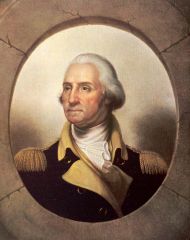![]()
![]()
![]()
Use LEFT and RIGHT arrow keys to navigate between flashcards;
Use UP and DOWN arrow keys to flip the card;
H to show hint;
A reads text to speech;
14 Cards in this Set
- Front
- Back
|
British laws to govern colonial trade and manufacturing
|

Navigation Acts
The Navigation "Ax" cut right through colonial business! |
|
|
The meeting of representatives from the colonies to decide what action to take against the British
|
Continental Congress
|
|
|
Leader of the Continental Army and the first president of the United States
|

George Washington
|
|
|
The turning point in the Revolutionary War
|

The Battle of Saratoga
That's "Sarah" in a "toga" |
|
|
The treaty signed by America, Britain and France to end the Revolutionary War
|
Treaty of Paris
|
|
|
Document giving Americans basic rights
|

Bill of Rights
Bill sez "You got rights!" |
|
|
An idea that all government power comes from the people
|
Popular Sovereignty
|
|
|
A colonist who supported Britain in the war
|
Loyalist
|
|
|
A government with power divided between the national (federal) govt and the states
|
Federal government
|
|
|
Describe colonial law, society and politics in the mid-1700s.
|
The colonies were ruled by British mercantile laws. They contained diverse ethnic and religious groups, and much free discussion in politics.
|
|
|
Explain why conflict between the colonists and Britain increased after 1763.
|
British Parliament increased taxes in the colonies to help pay for wars, so the colonists resented them.
|
|
|
Give an example of how Enlightenment ideas were reflected in the Declaration of Independence and the U.S. Constitution.
|
The Declaration of Independence contained many ideas by John Locke about natural rights and how government must protect these rights. The Constitution also recognized these rights.
|
|
|
Describe the idea of separation of power and give two examples of how your life would be different if the Constitution did not guarantee it.
|
The separation of powers means the separation of a government's branches into different branches which balance the other branches with certain checks and balances. Without the separation of powers, I would enjoy less personal freedom and rights, and I would not be able to vote in elections.
|
|
|
What reasons might a Loyalist have for opposing the American Revolution?
|
The British army was huge, and they had lots of money and ships, while the American army was small and poorly trained. They may have feared losing. They may also have enjoyed the stability of having another government ruling over them.
|

